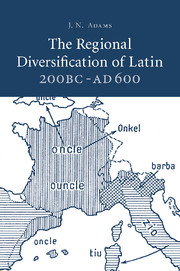Book contents
- Frontmatter
- Contents
- List of maps
- Preface
- List of abbreviations
- Chapter I Introduction
- Chapter II The Republic: inscriptions
- Chapter III Explicit evidence for regional variation: the Republic
- Chapter IV Explicit evidence: the Empire
- Chapter V Regionalisms in provincial texts: Gaul
- Chapter VI Spain
- Chapter VII Italy
- Chapter VIII Africa
- Chapter IX Britain
- Chapter X Inscriptions
- Chapter XI Conclusion
- Maps
- Bibliography
- Index verborum
- Subject index
- Index locorum
Chapter IX - Britain
Published online by Cambridge University Press: 22 September 2009
- Frontmatter
- Contents
- List of maps
- Preface
- List of abbreviations
- Chapter I Introduction
- Chapter II The Republic: inscriptions
- Chapter III Explicit evidence for regional variation: the Republic
- Chapter IV Explicit evidence: the Empire
- Chapter V Regionalisms in provincial texts: Gaul
- Chapter VI Spain
- Chapter VII Italy
- Chapter VIII Africa
- Chapter IX Britain
- Chapter X Inscriptions
- Chapter XI Conclusion
- Maps
- Bibliography
- Index verborum
- Subject index
- Index locorum
Summary
THE COMING OF LATIN TO BRITAIN
Latin reached Britain earlier than might be thought. Britain was occupied by the Romans in AD 43, but there are signs that British rulers had acquired some Latin before the conquest. The evidence is to be found in local Iron Age coin issues. I draw here on several persuasive articles by Williams (2000, 2001, 2002, 2005). The coins of a certain Tincomarus, probably a king, whose correct name has only recently been established from the discovery of a hoard of gold coins at Alton, Hampshire, are of particular interest. His name has the Latin -us nominative inflection rather than the Celtic -os, but what is more striking is a coin type which has a Latin filiation, abbreviated, COM · F (= Commi filius), on the obverse. By contrast gold coins bearing the name of the apparent father have the legend COMMIOS, with the Celtic ending. There has been a switch of languages between the time of father and son. The gold coins of Commius, according to Williams (2001: 8), tend to be dated to the 30s or 20s BC. Elsewhere, commenting on Tincomarus, Williams (2002: 143) remarks that the dates of the named kings of Iron Age Britain are ‘probably less secure than we like to think’, but adds that ‘the most sensible convention … places Tincomarus and Tasciovanus … around the end of the 1st c. B.C. in a loosely defined period between c.20 B.C. and A.D. 10’.
- Type
- Chapter
- Information
- The Regional Diversification of Latin 200 BC - AD 600 , pp. 577 - 623Publisher: Cambridge University PressPrint publication year: 2007



